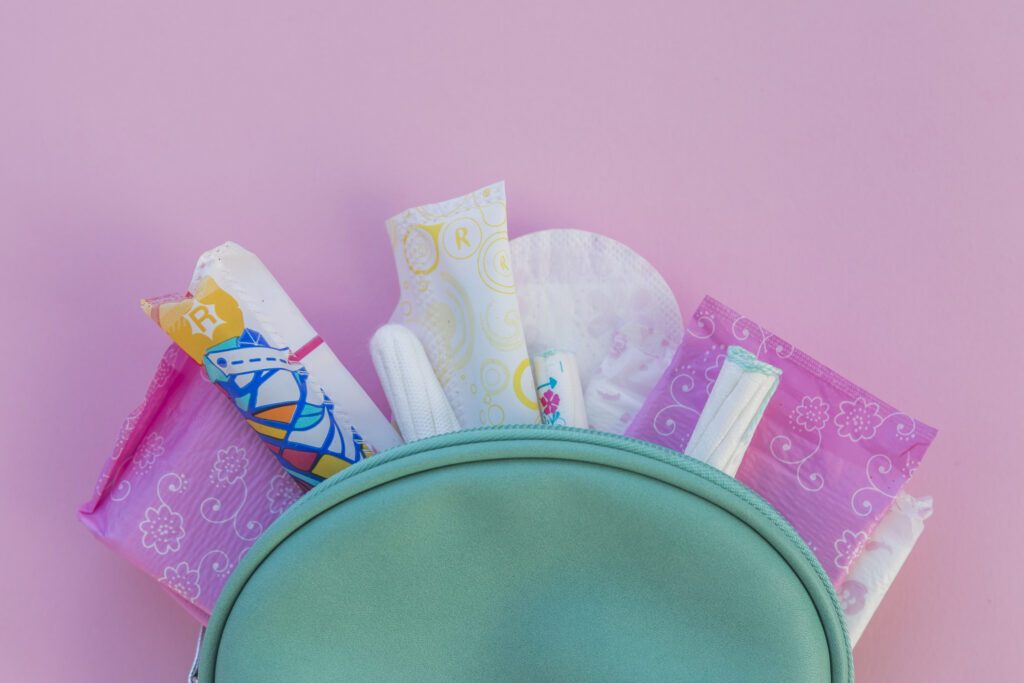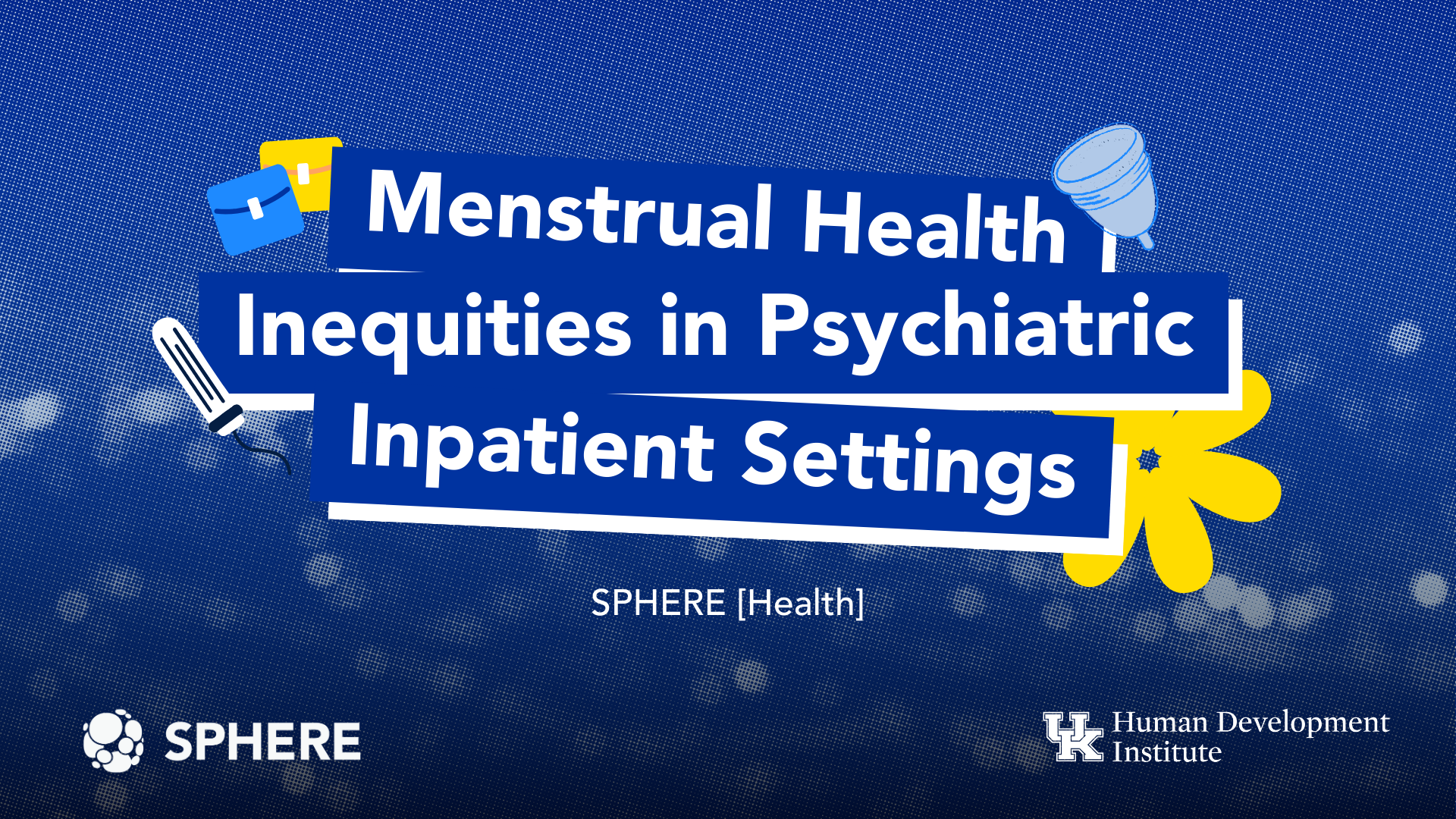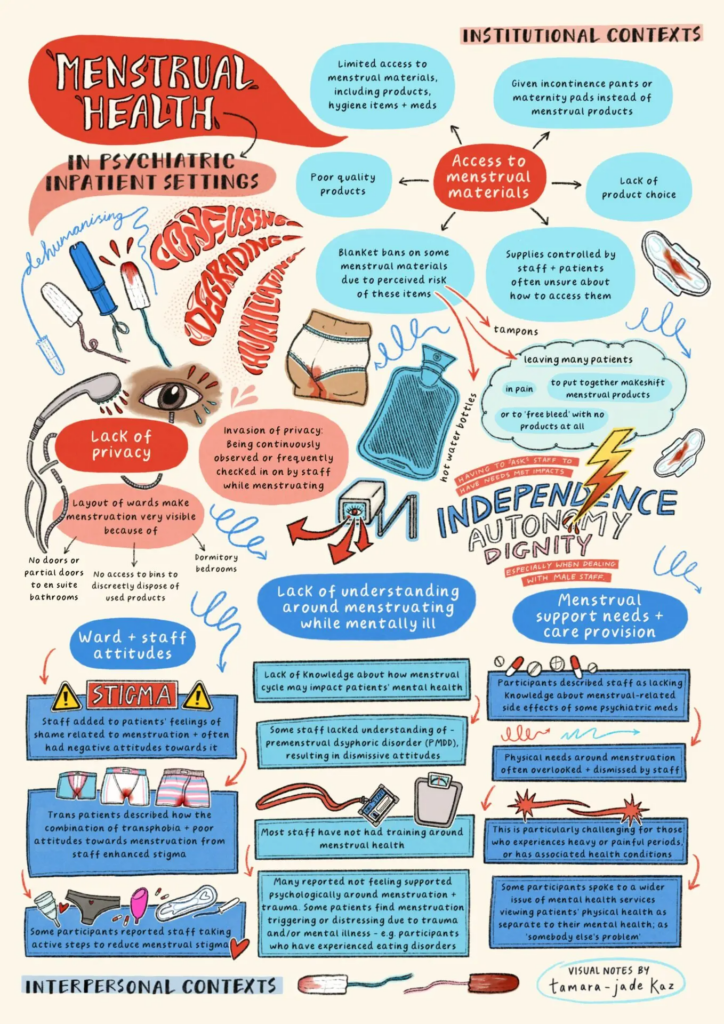Written by Bailey Patterson
Inpatient stays at hospitals or other treatment facilities are a part of life for many people with psychiatric disabilities. While receiving inpatient services, maintaining a healthy body and mind is important.
For those who menstruate, reproductive healthcare is essential, even at times when other health concerns might be at the forefront of the mind. Menstrual products, like pads and tampons, are a basic reproductive healthcare need. Many people receiving inpatient treatment don’t have access to quality menstrual products that protect their dignity and autonomy.

It is common for hospitals and treatment centers to have strict and specific guidelines for what patients can bring into treatment. Many patients are not permitted to bring their personal menstrual products, even if they had the opportunity to pack them for their stay. This means patients rely on facilities to provide necessary products.
Some patients have reported a lack of supplies or needing additional supplies. On the Stigma Silenced [Stories Spoken] podcast, episode two guest, Taylor Price, spoke about her experience with this situation. She recalled, “This is very personal, but one thing I remember is that [I couldn’t] get feminine products because they were, for some reason, it was some bureaucratic system, but they were like, ‘We don’t have them in this location right now.’ [So I went] two days without feminine products [and] normal clothes. I was wearing a hospital gown and [felt] uncomfortable in my skin.”
Price is not alone in this experience. The National Survivor User Network conducted research into menstrual health in psychiatric inpatient settings and found a variety of factors that may have adverse effects on patients in the United Kingdom. They found reports of facilities that did not keep sufficient period products, but this was not the only concern they discovered. For example, they found reports of:
- Lack of choice of menstrual product provided: Some patients are only afforded access to pads or adult diapers instead of their products of choice (like tampons) due to preferred products being deemed “unsafe.” Some patients who are in highly restricted environments have reported being denied any products at all due to the “safety risk.”
- Difficulty accessing products: When period products are available, many facilities require patients to report they are on their period and in need of products. This can be embarrassing for some people, especially in a situation where the only staff on duty are cisgender men.
- Inadequate menstrual education of staff: Some patients reported being given less than the needed amount of period products and receiving disbelief from staff when they communicate their need for more products.
- Lack of privacy: In many inpatient facilities, patients are not permitted to close the doors to their bathrooms. Some patients may even have “one-on-one” supervision, meaning staff has to accompany them to the restroom. This can result in additional anxiety and embarrassment to people who are menstruating.
- Stigma against transgender patients: Transgender patients who menstruate have reported stigma and biased attitudes from staff members.
The physical and mental health of psychiatric patients in inpatient settings should be prioritized in regards to menstruation. Adequate supplies, reducing stigma and promoting dignity should be supported. Patients strongly believe the state of menstrual wellbeing in inpatient psychiatric settings needs improvement. Patients have called for wider access to a variety of menstrual products on hand, more thoughtful systems for receiving needed products, increased privacy on wards to strengthen patients’ sense of dignity, and better menstrual health education for staff that includes anti-bias training.
Menstrual Health Access Resources:
University of Kentucky’s Take a Tampon: /uky.campuslabs.com/engage/organization/takeatampon
Take a Tampon was started with the goal of providing free and accessible hygiene products to students at UK and in the Lexington community. This organization hosts donation drives, hosts events to raise awareness, and is responsible for the menstrual hygiene product baskets located around campus
Menstrual Freedom Coalition at University of Louisville: louisville.edu/womenscenter/resources/menstrual-freedom-coalition
The Menstrual Freedom Coalition (MFC) is a coalition of campus and community partners, who come together dedicated to challenging period stigma and dismantling barriers. MFC promotes menstrual equity through resource-sharing, educational workshops and community building to empower individuals who menstruate to live their lives to the fullest. Period.
KY Period Project: www.kyperiodproject.org
A menstrual equity program for women & girls in the Kentuckiana area.

